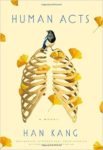Translated literature offers an opportunity rarely seen in American literature. We know America, we grew up here, we reflect — if not create — its culture. Books from other countries allow us to go someplace that is, by definition, alien. They can immerse us in the country’s culture and let us see life from a different perspective. They also, though, enable us to discern aspects of the human condition that are universal.
Two such aspects are, sadly, violence and human suffering. Korean novelist Han Kang acknowledges she wants to explore those facets with her writing. She admits to being haunted by the fact that violence “is part of being human.” And she professes that she tends to want to “delve deeper” into human suffering “as I’m always trying to discover the truth behind a person.” As dismal as that may sound, those topics were key to her The Vegetarian, one of 2016’s most highly regarded books and winner of the Man Booker International Prize.
The Vegeterian was a look into these issues centered around Yeong-hye, a young Korean housewife who suddenly refuses to eat or cook meat or allow it in her house. While becoming a vegetarian isn’t disconcerting in America, Koreans share meals together as part of creating and maintaining emotional bonds and intimate relationships. Thus, Yeong-hye’s decision is seen as deviant and defiant and starts her on a path full of suffering and violence.
 Human Acts, Kang’s latest novel to be published in English, doesn’t address these issues allegorically or focus on one person. Instead, it is built upon the Gwangju Uprising in May 1980, in which college students and others engaged in a mass protest against the military government were fired upon, killed, and beaten by government troops. Thousands were arrested. Disputes surround the number of civilian deaths. The government said less than 200 were killed while foreign press estimates ranged as high as 2,000.
Human Acts, Kang’s latest novel to be published in English, doesn’t address these issues allegorically or focus on one person. Instead, it is built upon the Gwangju Uprising in May 1980, in which college students and others engaged in a mass protest against the military government were fired upon, killed, and beaten by government troops. Thousands were arrested. Disputes surround the number of civilian deaths. The government said less than 200 were killed while foreign press estimates ranged as high as 2,000.
Like The Vegeterian, each chapter of Human Acts is told from the perspective of a different character, relating the impact of the killings from different points in time. They are “The Boy” and “The Boy’s Friend” in 1980, “The Editor” in 1985, “The Prisoner” in 1990, “The Factory Girl” in 2000, and “The Boy’s Mother” in 2010. Except for the mother, all were on the scene. With The Boy, Dong-Ho, and his mother bookending the chapters, his death is the major plot line around which the novel is built. Dong-Ho, who recently entered the Korean equivalent of ninth grade, helps in a gymnasium with two slightly older women, The Editor and The Factory Girl, washing, cataloging and laying out for identification bodies of those killed during the 10-day uprising.
Although each narrator’s story adds dimension to the novel’s motif, The Prisoner may raise the core motif of the book. Each day, he says, he is eaten away asking “why did he die, while I’m still alive?” Here is how he encapsulates Kang’s essential questions:
Is it true that human beings are fundamentally cruel? Is the experience of cruelty the only thing we share as a species? Is the dignity that we cling to nothing but self-delusion, masking from ourselves the single truth: that each one of us is capable of being reduced to an insect, a ravening beast, a lump of meat? To be degraded, slaughtered – is this the essential of humankind, one which history has confirmed as inevitable?
While these are grim questions incapable of resolution, by raising and addressing them through the eyes of different observers, Kang provides as effective a way as any to explore and contemplate them. While a novel is a potent medium, the Gwangju Uprising isn’;t the only nonfiction underpinning Human Acts. In an epilogue, Kang explains that her family moved from Gwangju to outside Seoul months before the uprising. Kang, nine at the time, describes how the events affected her and her research into it. As for Dong-Ho, he was a member of the family who bought the house from Kang’s family.
Conscience, the most terrifying thing in the world.
Han Kang, Human Acts







